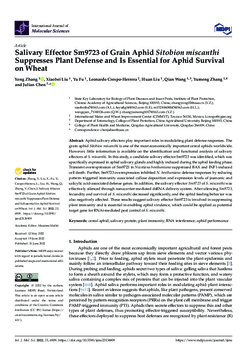Salivary effector Sm9723 of grain aphid sitobion miscanthi suppresses plant defense and is essential for aphid survival on wheat
Abstract
Aphid salivary effectors play important roles in modulating plant defense responses. The grain aphid Sitobion miscanthi is one of the most economically important cereal aphids worldwide. However, little information is available on the identification and functional analysis of salivary effectors of S. miscanthi. In this study, a candidate salivary effector Sm9723 was identified, which was specifically expressed in aphid salivary glands and highly induced during the aphid feeding phase. Transient overexpression of Sm9723 in Nicotiana benthamiana suppressed BAX and INF1-induced cell death. Further, Sm9723 overexpression inhibited N. benthamiana defense responses by reducing pattern-triggered immunity associated callose deposition and expression levels of jasmonic and salicylic acid-associated defense genes. In addition, the salivary effector Sm9723 of S. miscanthi was effectively silenced through nanocarrier-mediated dsRNA delivery system. After silencing Sm9723, fecundity and survival of S. miscanthi decreased significantly, and the aphid feeding behavior was also negatively affected. These results suggest salivary effector Sm9723 is involved in suppressing plant immunity and is essential in enabling aphid virulence, which could be applied as potential target gene for RNAi-mediated pest control of S. miscanthi.

